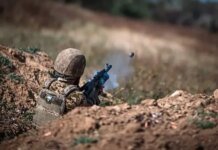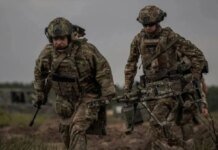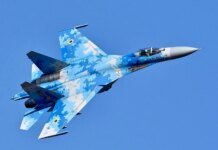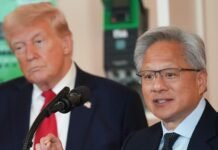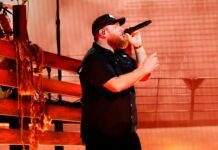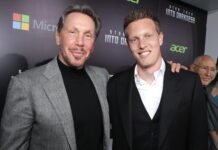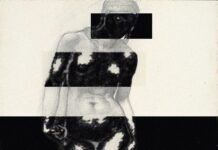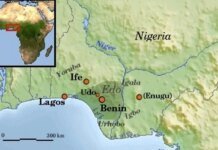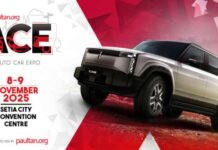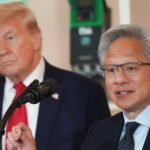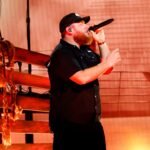Getty Images; Kristina Bumphrey/Getty Images; Alyssa Powell/BI
Three years ago, Noah Silverman and Yuki Kinoshita's Plufl — "the world's first dog bed for humans" — went viral on TikTok and landed them on "Shark Tank".
Mark Cuban got a kick out of contorting his 6-foot-2 frame into the plush, doughnut-shaped bed and teamed up with fellow shark, Lori Greiner, to invest $200,000 in the company.
Like many ideas that take off on "Shark Tank," Silverman and Kinoshita promised to scale quickly and keep costs low by producing in China, where their $399 Plufls could be made for $140. By 2023, Plufl had logged $1 million in sales. Heading into this year, it was preparing to add up to $8 million in retail business.
But a year of steep tariffs and turbulent trade negotiations challenged that formula, sending Silverman and Kinoshita — and many other former "Shark Tank" contestants — scrambling to rethink their supply chains.
"This year was supposed to be the year of retail. Unfortunately, things kind of took a turn with the tariffs," Kinoshita said on the DTC podcast this summer. "That's just the nature of when you manufacture something overseas. You don't fully control your supply chain, you don't fully control your costs. It's not expected, but it's part of the game."
"Shark Tank" is brutal by design: contestants have two minutes to make their pitch before facing a spray of tough questions from the panel of investors — all to a TV audience of millions. If they're lucky enough to get an offer, or multiple competing offers, the entrepreneurs are given seconds to decide what to do.
As "Shark Tank" began airing its 17th season last month on ABC, stories like Plufl's were everywhere. Tariffs had been driving up costs and upending supply-chain playbooks, and consumer sentiment was down. Adding to the difficulty, distribution and product discovery models, like TikTok, have been shifting rapidly.
I'm always a proponent of making goods here, but not all companies can, which gets you to the point of raising prices or reducing margins.Mark Cuban
For businesses that rely on global supply chains and social virality, it sure feels like there's never been a trickier time to pitch a business on "Shark Tank." For the current crop of contestants, the cost of production and projected profits may have collapsed between their on-camera pitches and the time their episode airs.
Cuban, who stepped down after Season 16, acknowledged the pressure in an email to Business Insider. Unless contestants can figure out "price elasticity or ability to manufacture in the USA," he wrote, "the prognosis is not good."
"I'm always a proponent of making goods here, but not all companies can, which gets you to the point of raising prices or reducing margins," Cuban added.
For two decades, factories in China have offered the best opportunity for American small businesses to scale while maximizing profits and keeping prices low.
That thinking has been built into the reality show's DNA since "Shark Tank" premiered in 2009. Many of its most successful companies, including Tipsy Elves sweaters and the Rinseroo pet shower, have made all or part of their products in China, at least initially — and often at the sharks' urging.
It was on display during the third season, when Donny McCall pitched the Invis-A-Rak foldable cargo management system and got a confused response when he said he'd produce it in his hometown of Sparta, North Carolina, at a cost of $250 each.
"Let's just say that a manufacturer in Asia could make that for $150," Kevin O'Leary, the shark known as "Mr. Wonderful," counseled him. "That puts you in business right there, my friend." McCall walked away without a deal, though he credits his appearance on the show with boosting his business.
President Donald Trump's America First tariffs have challenged that calculus.
White House spokesperson Kush Desai says that Trump's "business experience" is informing his "America First agenda," and "entrepreneurs and everyday Americans alike can rest assured that the best is yet to come."
While Trump is betting the tariffs will boost domestic manufacturing in the long term and secure more favorable terms for US businesses, they've forced entrepreneurs to navigate a dizzying array of unknowns.
"On a macro level, investments are freezing up," says Benjamin Jones,professor of entrepreneurship and strategy at Kellogg School of Management at Northwestern University. "If you are an entrepreneur, and you plan to be able to source some of your products from a low-cost place, and that is suddenly no longer something you can do because of the tariffs that keep changing. That uncertainty doesn't make a successful case to funders."
O'Leary did not respond to Business Insider's request for comment. But he's been vocal in his support of Trump's tariff strategy as a way to "level the playing field" for US businesses.
Even the show's most successful contestants have been feeling the pinch.
Craig Sjodin/Disney General Entertainment Content via Getty Images
Aaron Krause's smiling Scrub Daddy sponges sparked a bidding war when he pitched the idea on the fourth season of "Shark Tank." Since landing a $200,000 investment from Lori Greiner, Scrub Daddy has gone on to become one of the most successful businesses in "Shark Tank" history. The cheerful, tough-on-grease scrubbers are sold in 47 countries.
But Krause, whose company works with manufacturing facilities in Vietnam and Mexico, says he entered crisis mode last spring when Trump unveiled a hefty tariff on Vietnam, though the rate was later eased.
"I do think the sharks will have more of an upper hand this season because people are going to need money if they're going to start manufacturing in the US," Krause says. "But to be honest, a lot of the expertise that you need for apparel and electronics, that stuff just isn't here right now. And I don't know if an investment on "Shark Tank" could fix that."
Steward Gold, whose Dingle Dangle baby-changing gadget got an investment from O'Leary during season 15, says he will also be watching to see if the sharks change their tune this season.
The Dingle Dangle, which is made in China, got off to a strong start after Gold's appearance on "Shark Tank." But Gold says the tariffs posed an existential threat to his business and squeezed his margins, forcing him to slash his marketing budget and delay orders.
If he were appearing this season, Gold says he's not sure what he would say.
"It's a good question and a tough question," he says. "I think sharks may shy away more from product deals this time around, and especially those that are made overseas."
One thing that both the "Shark Tank" investors and many of the show's previous contestants can agree on: the sharks will have the upper hand this season.
Robert Herjavec, another "Shark Tank" investor, said as much at the start of the season.
"Entrepreneurs don't know what tomorrow is gonna look like," Herjavec said. "And that instability is making them lower expectations, which means better deals for us."
Joe Demin, whose company, Yellow Leaf Hammock, received an investment during Season 11, says the headwinds facing small businesses this year could impact the valuations of companies that appear on Shark Tank. Demin's company, which sells hammocks and other products made in Thailand, saw a 30% hike in its production costs and had to pause all new projects and hiring.
"If the sharks are particularly hungry, they would get better deals because now they have maybe more negotiating power," Demin says. "I can see that playing out."
But some good ideas are still just good ideas.
Christopher Willard/Disney via Getty Images
During the premiere episode of the current season, three out of four contestants received some level of funding.
One of them was the comedian Pete Davidson, who showed up to court investments for DoubleSoul, where he's creative director, and its "perfect everyday sock." DoubleSoul ended up accepting jewelry designer Kendra Scott's offer of $500,000 for 10% equity.
DoubleSoul had a lot going for it in these uncertain times.
Socks are cheap to produce and always in demand. Davidson's and other celebrities' involvement lends cultural cachet. If Scott stocks DoubleSouls in her namesake stores, that will boost sales.
Double Soul produces its socks in Turkey, which has a comparatively modest 15% tariff.
And, if nothing else, the brand just got a powerful boost from being featured on "Shark Tank."
Katherine Li is a reporter on Business Insider's West Coast business news team.
Read the original article on Business Insider



